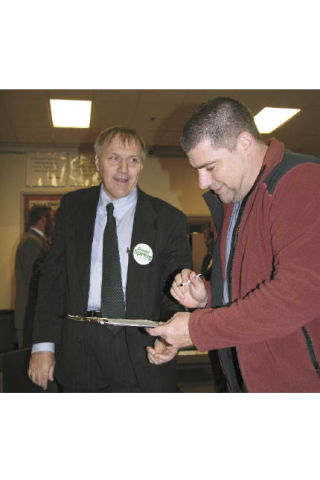The six candidates for legislative office in the 5th District aired their views on growth, education, health care, taxes and transportation to residents Thursday evening, Oct. 9, in the Mount Si High School auditorium.
Questions and answers came fast and furious at the candidate forum, held by the Snoqualmie Valley Chamber of Commerce in partnership with Snoqualmie Valley School District. A panel of four adults and four students from Valley schools, including two from Mount Si High School and two from Two Rivers School, provided questions for 5th District Republican incumbent Sen. Cheryl Pflug and her Democratic challenger Phyllis Huster, Republican incumbent State Rep., Pos. 1, incumbent Jay Rodne and challenger Jon Viebrock, and Republican incumbent Pos. 2 State. Rep. Glenn Anderson and Democratic challenger David Spring.
Some of the more heated moments of the night included Anderson and Spring’s lively debate on state matching funds for Snoqualmie school construction, and Huster’s taking aim at Pflug’s environmental voting record.
Spring said he was spurred to run by inequities in how the state funds education construction in the Valley. After asking friends why they didn’t vote for the latest school bond, Spring said he learned that the state was only paying about 3 percent in matching funds.
“No community in the history of our state has had to pay the entire cost of a high school, and yet that’s what the state wanted us to pay,” he said.
Anderson rebutted that Spring’s take on the issue was wrong, saying that the state typically spends upwards of 40 percent in matching funds for certain aspects of school construction. Spring fired back that the state’s formula for funding schools is broken.
“State law is specifically designed to prevent any legislator from influencing the construction of schools in their district,” Anderson said, charging that his opponent is making it harder for the Valley to get a new high school.
Growth and nature
On the topic of environment, state Senate challenger Phyllis Huster described her opponent as a green dud, after scoring a roughly 40 percent rating from the Washington Conservation Voters. Huster said she’d take an “out of the box” approach to the environment and urban sprawl.
Pflug replied that she’s proud of her rating.
“I vote with them when it make sense,” she said, but not when policies don’t make sense for the community.
Talking economic growth, Pflug told listeners that small businesses are the economic engine for the state. Businesses need affordable power and reliable regulation.
Huster said she would have the state support small, community-sized banks, and give relief to small business so they can grow.
Anderson referenced the former Weyerhaueser mill site as a possible center for economic growth for the entire Valley. He said he’d work to support whatever the community chooses to site there.
Spring seeks more state-sponsored opportunities in the Valley, starting with job training. He wants satellite campuses for Bellevue Community College, Lake Washington Vocational Technical School and the University of Washington.
On spending and taxes, Rodne said Washington needs to pick its priorities.
Viebrock predicted a session of slashing spending to make ends meet. Hiring freezes, cutting positions for low-priority programs, cutting state travel costs, and consolidating departments were some of the ways Viebrock would save costs. On education, he would push to have students go beyond the three Rs, learning work and computer skills.
“We need to be graduating well-rounded students who can think on their feet,” he said. He wants to see diversified education, adequate facilities and a better approach to testing.
Rodne said Washington should restore priorities in education, with science and math as the bedrock of training skills that the economy requires.
“It’s highly appropriate that a student should establish mastery of certain course subjects for a diploma,” he said. “We can look at alternative ways of achieving that.”
With the region’s population exploding, Viebrock talked about making bus connections to the major employment centers.
Rodne said he disagrees with transportation policies designed to force people out of their cars. He called the latest Eastside light rail project a $6 billion boondoggle.
Spring said he opposes tolling the major highway crossings as a tax on the poor and middle class.
With gas efficiency in cars rising, Anderson said a gas tax isn’t the answer. The state may have to use general funds for transportation fixes, he said.


